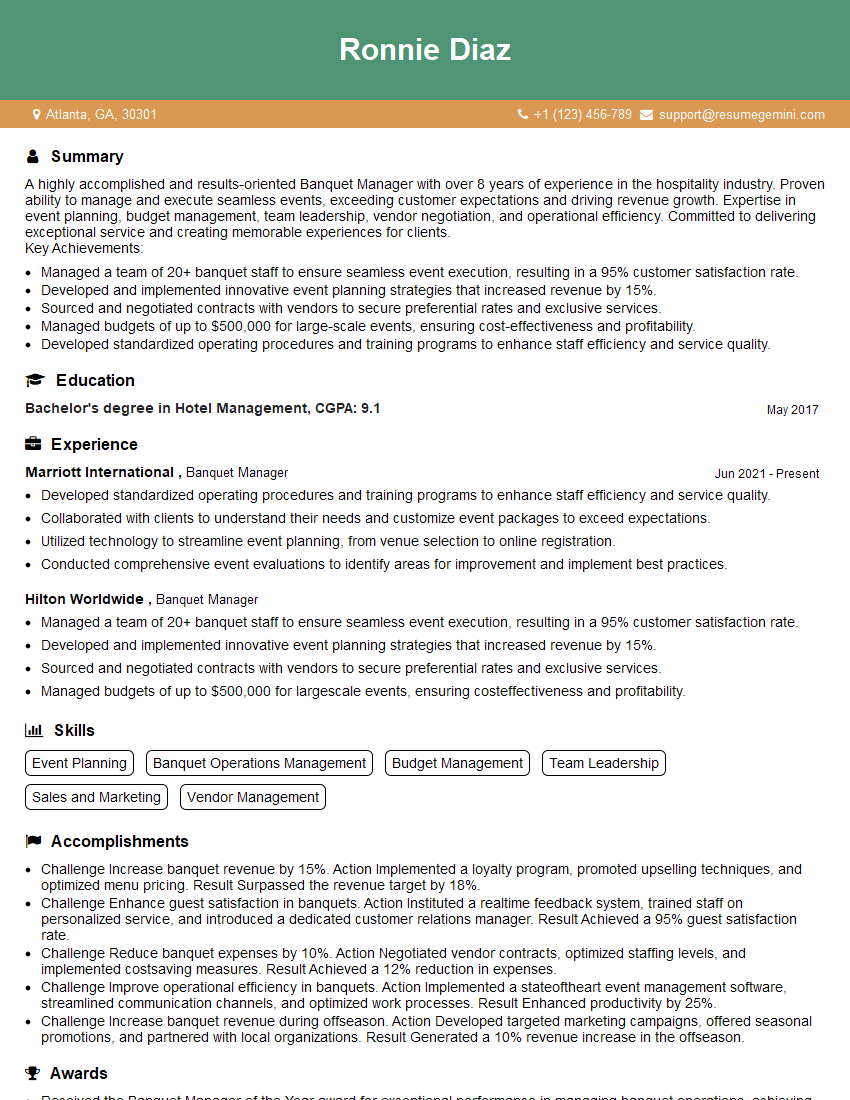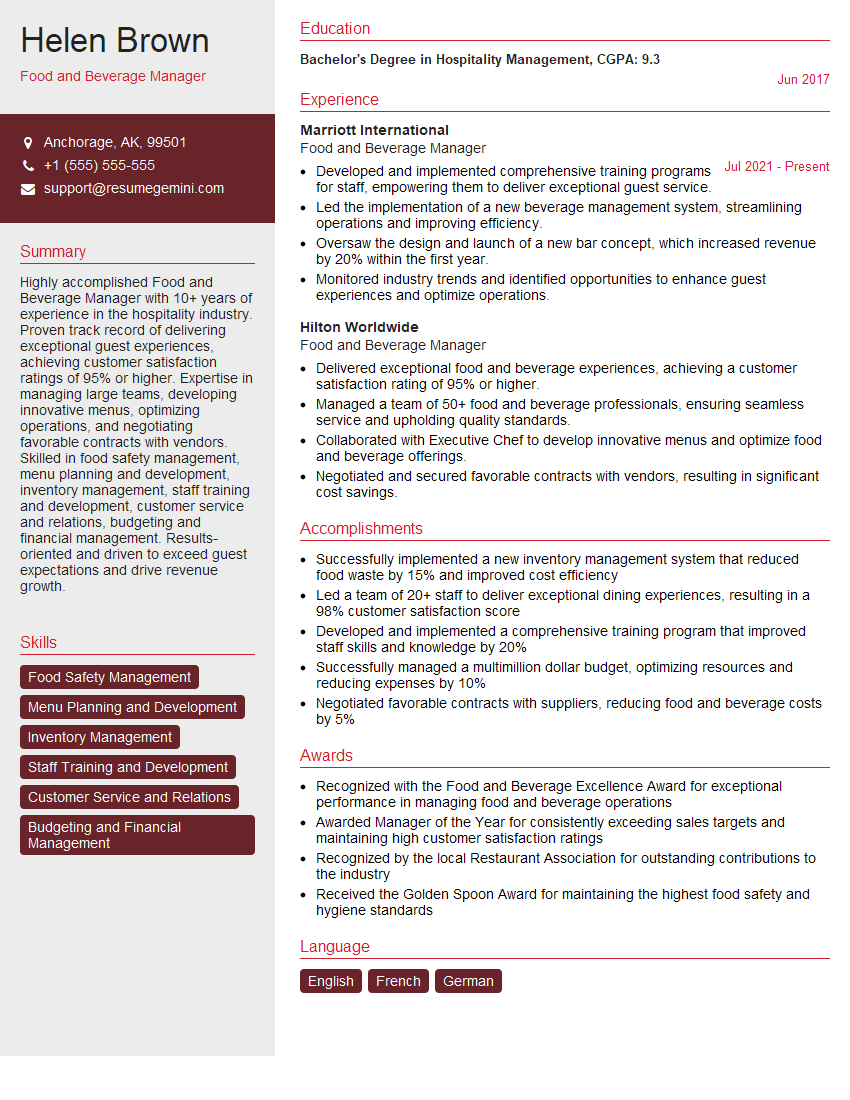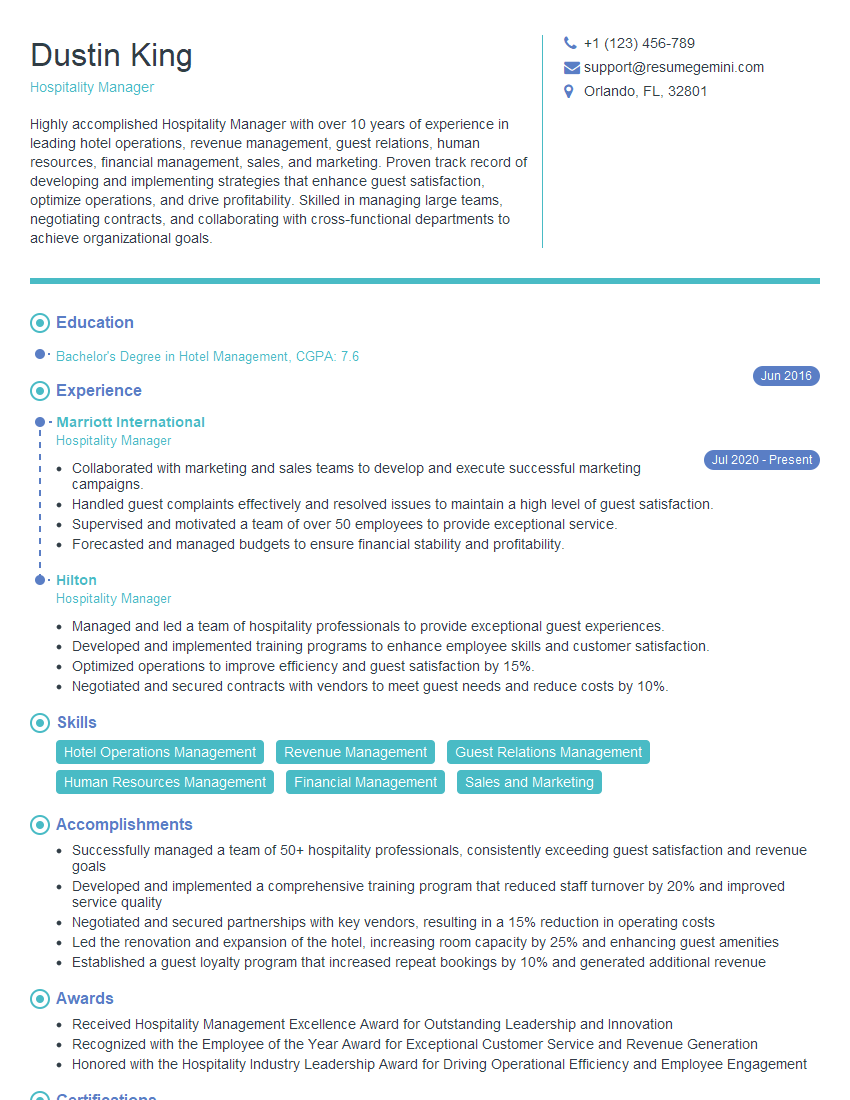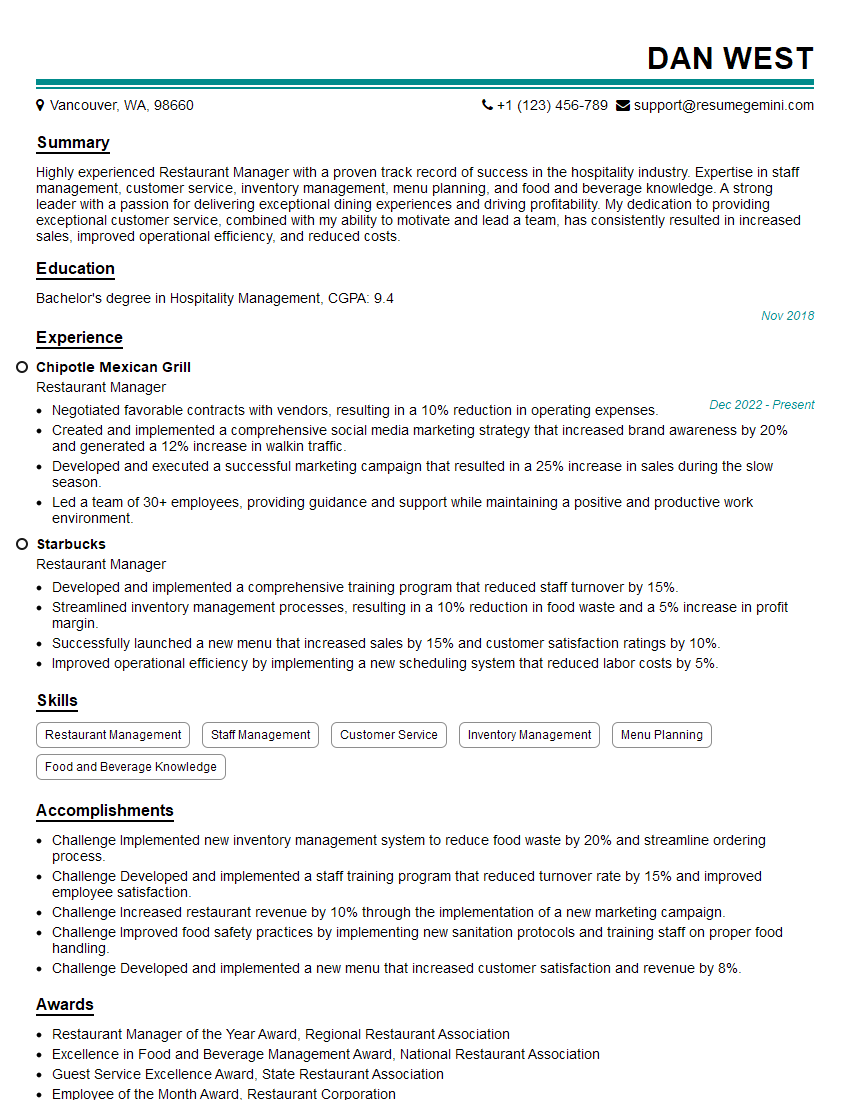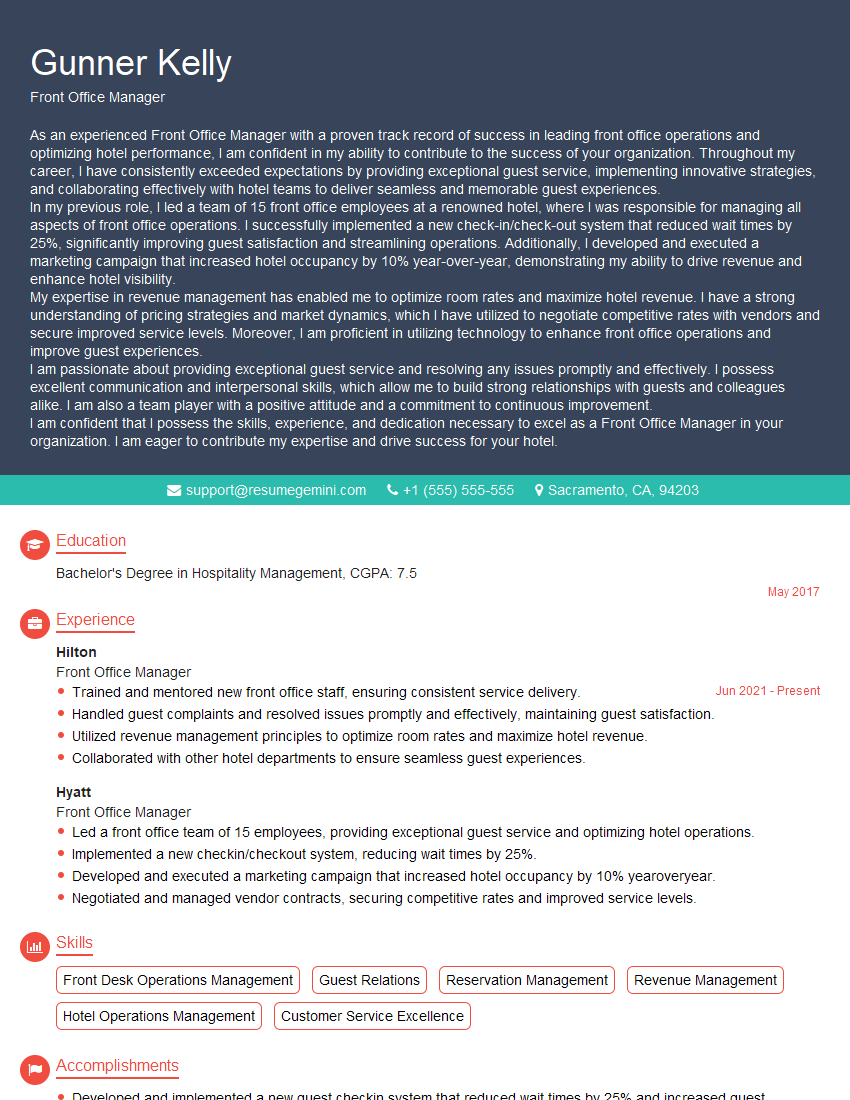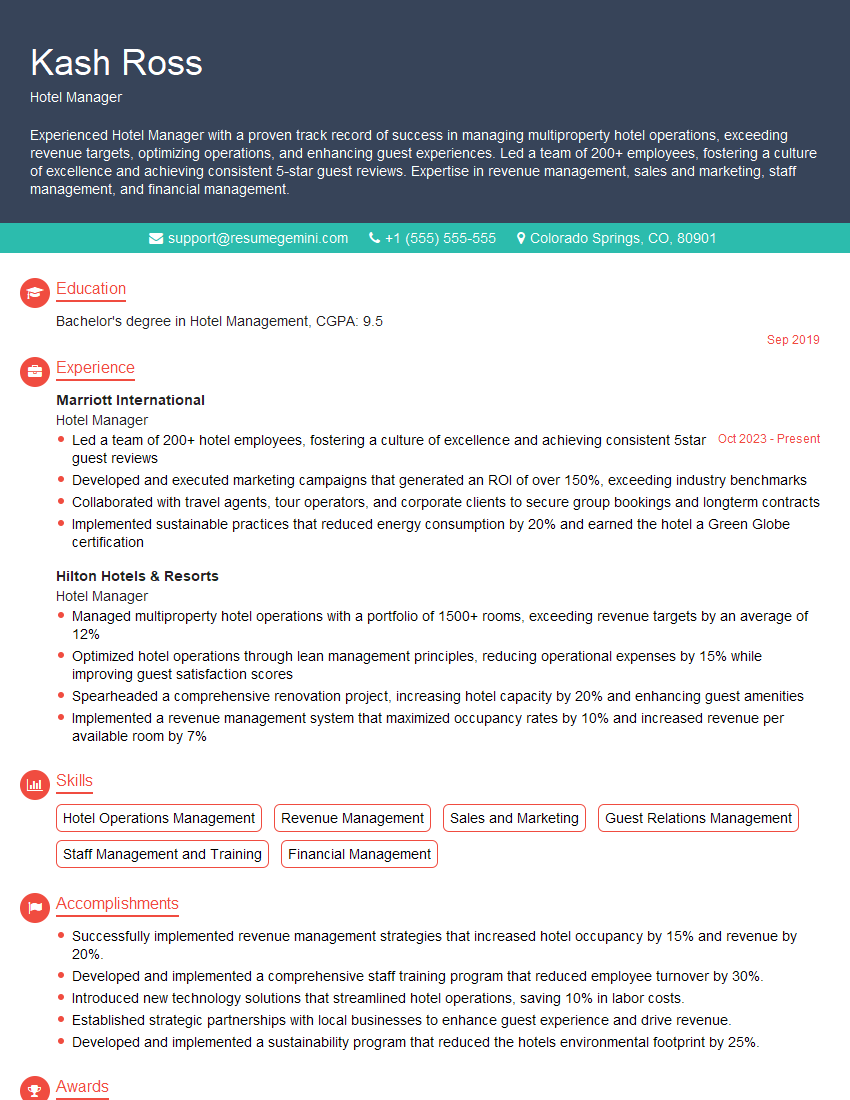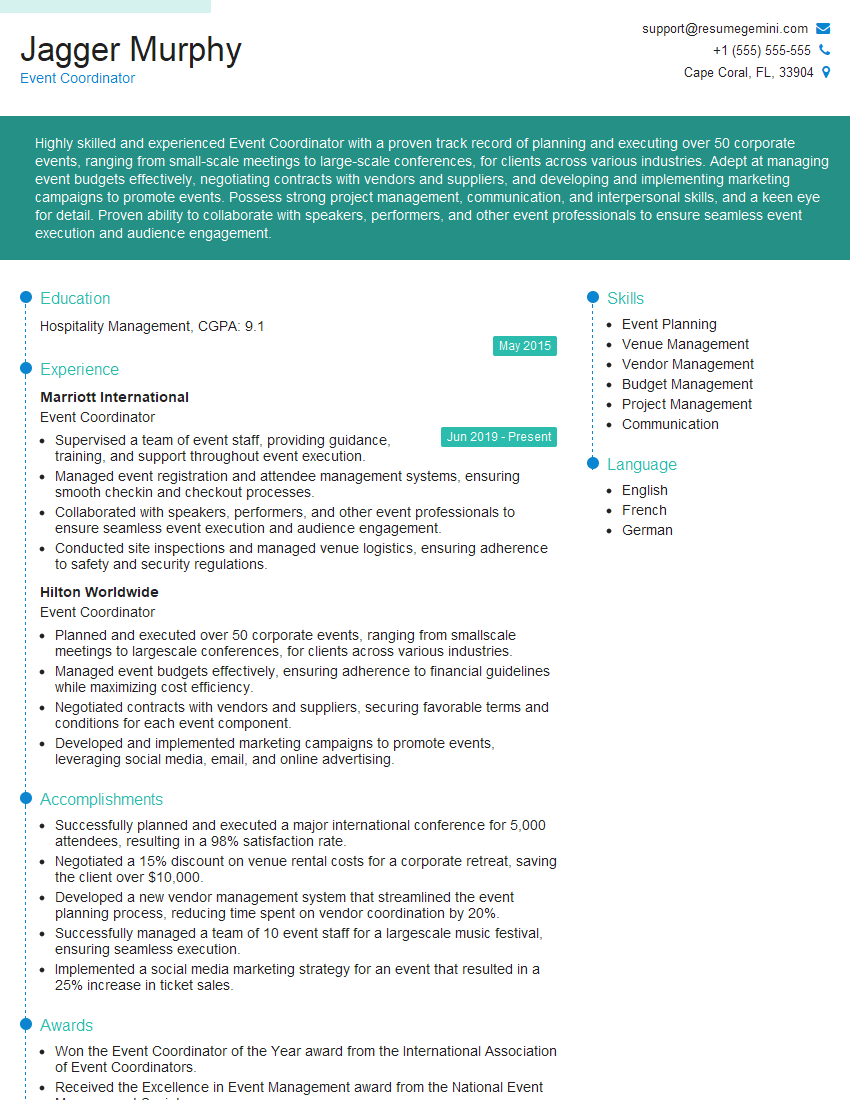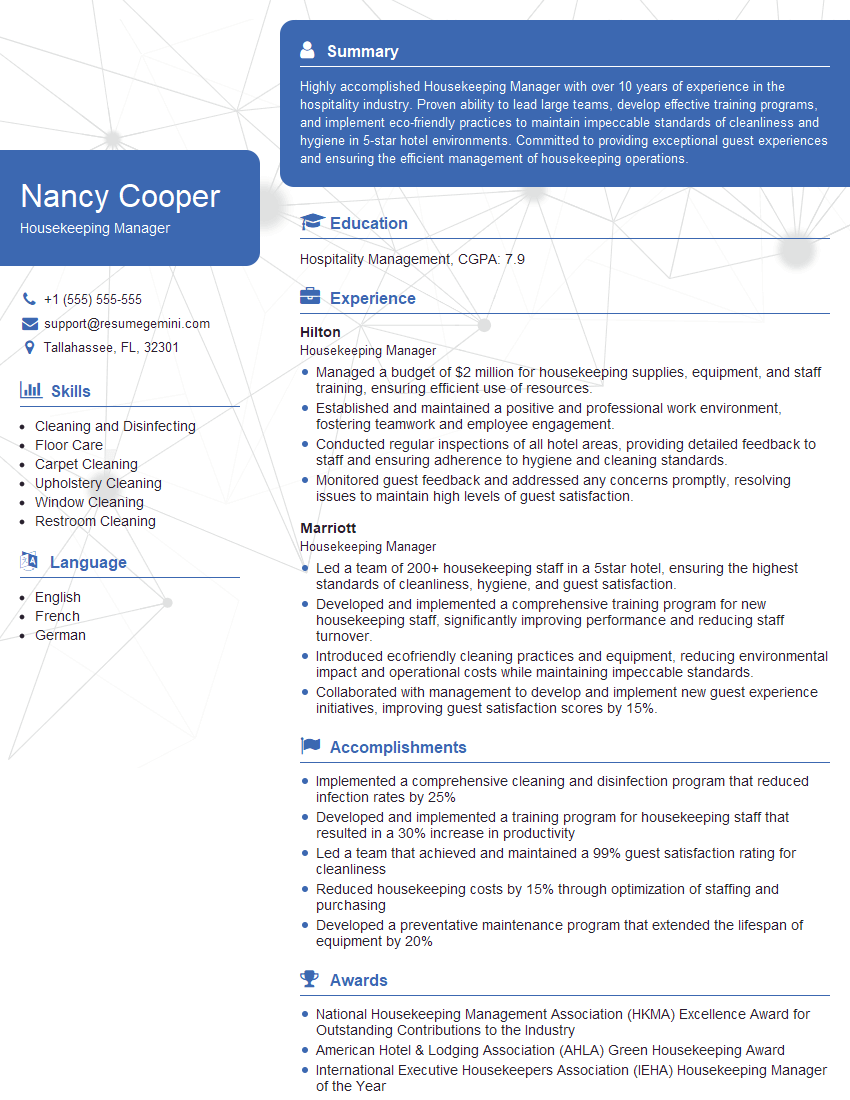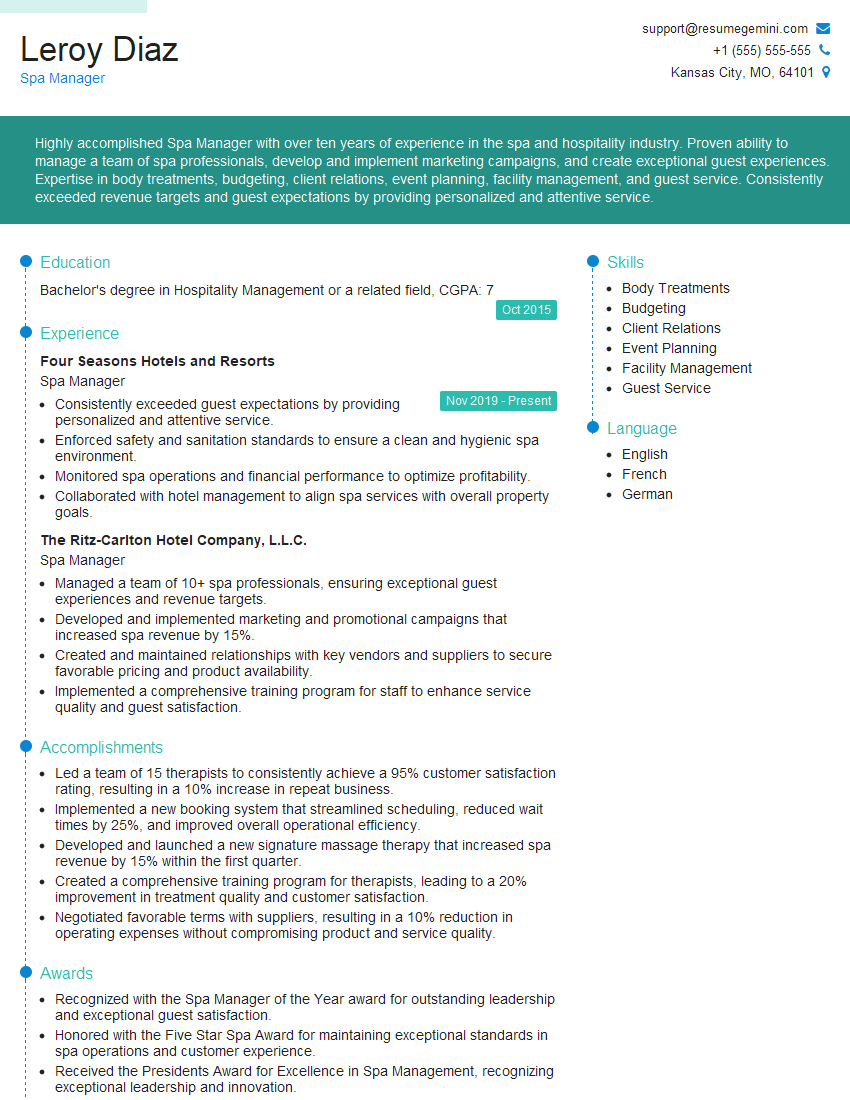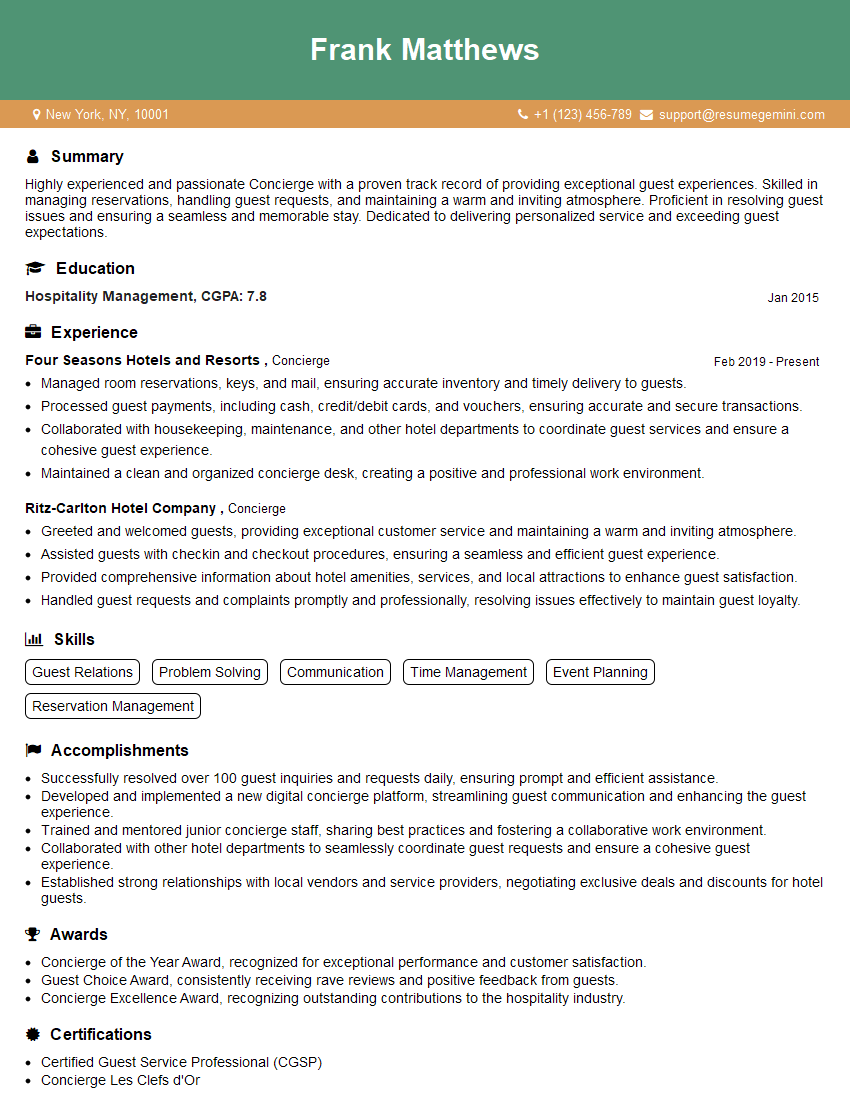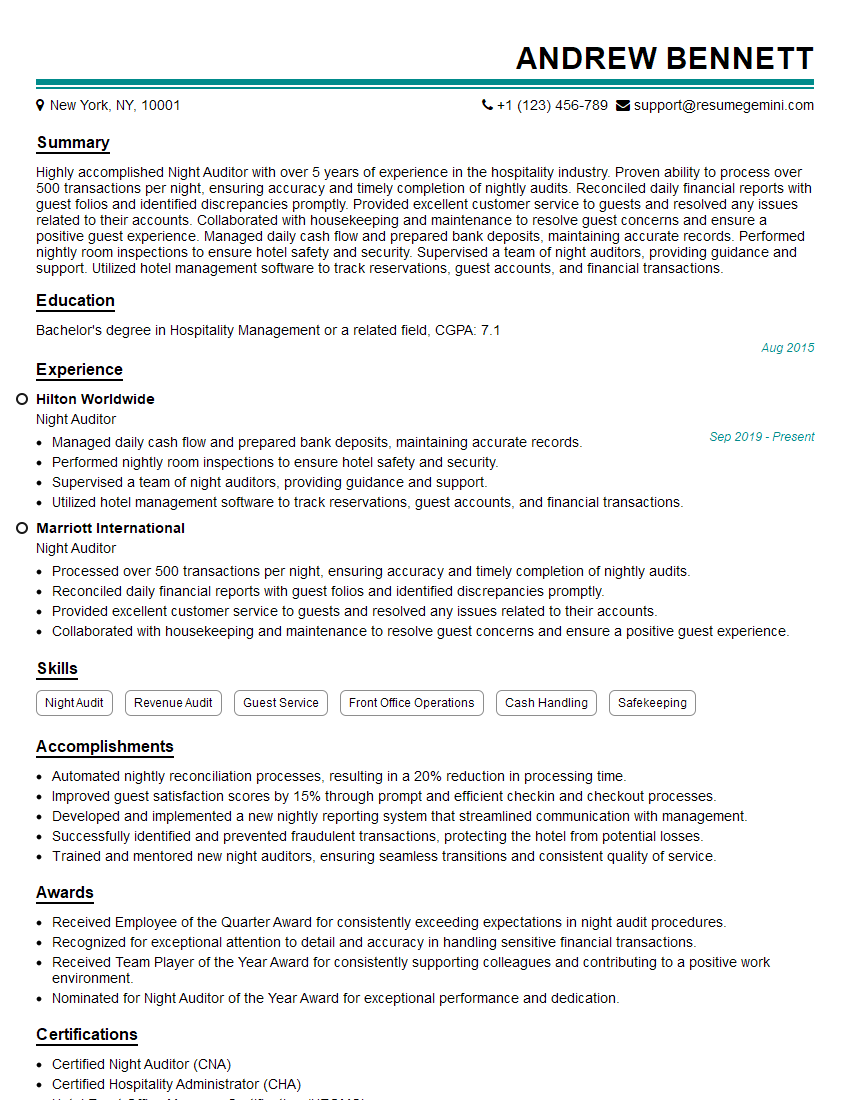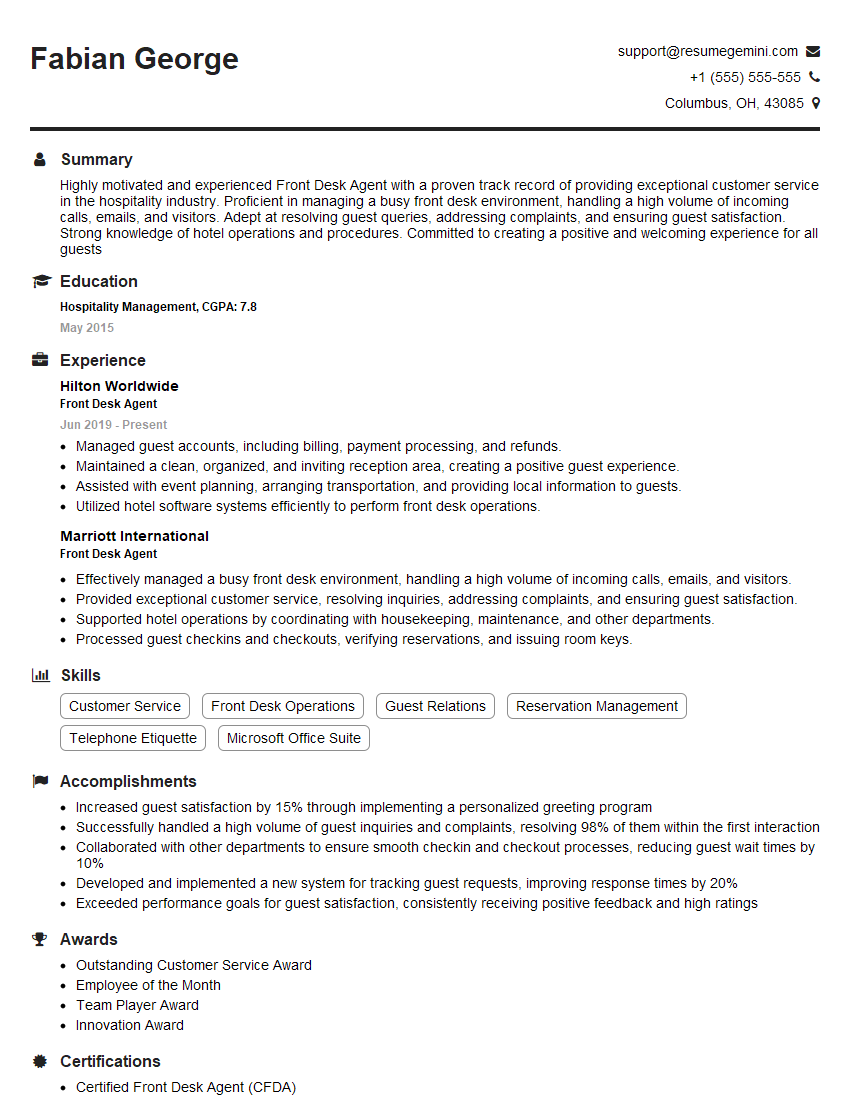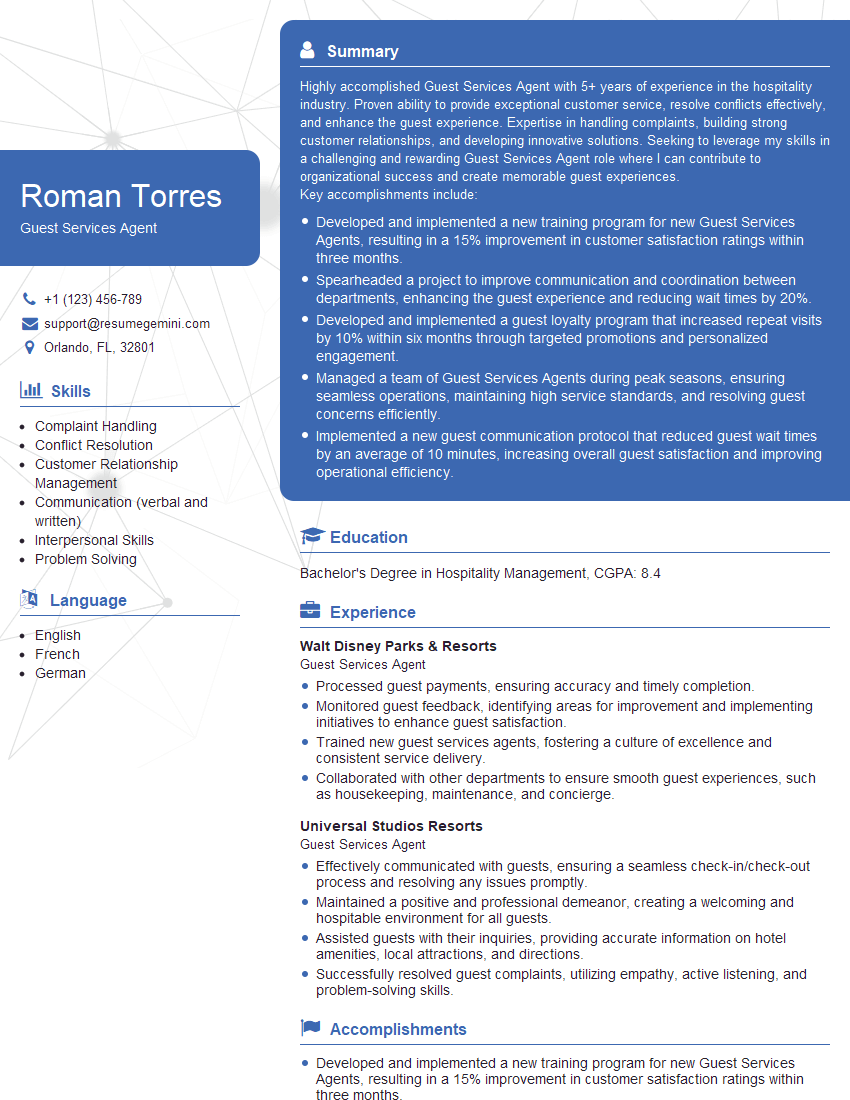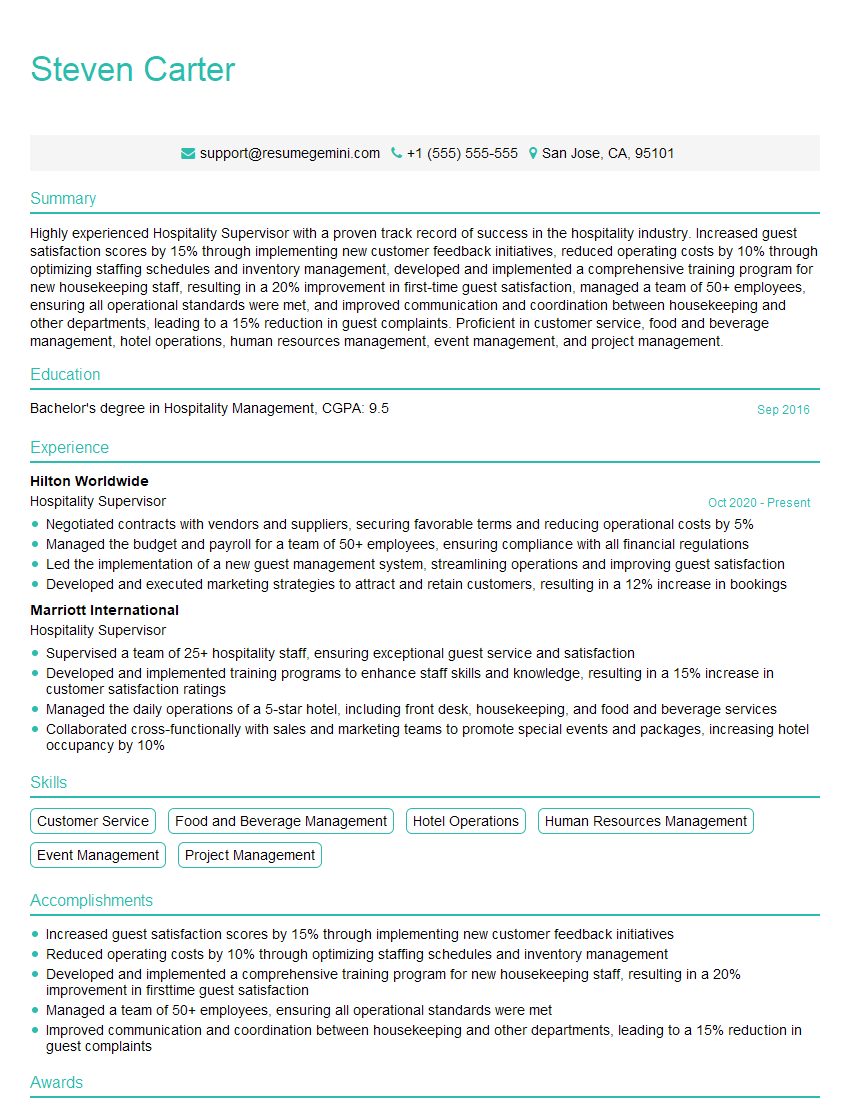Interviews are more than just a Q&A session—they’re a chance to prove your worth. This blog dives into essential Hospitality and Guest Relations interview questions and expert tips to help you align your answers with what hiring managers are looking for. Start preparing to shine!
Questions Asked in Hospitality and Guest Relations Interview
Q 1. Describe your experience handling difficult guest complaints.
Handling difficult guest complaints requires a calm, empathetic, and solution-oriented approach. My strategy focuses on active listening, acknowledging the guest’s feelings, and taking ownership of the situation, even if the issue wasn’t directly caused by our team. I avoid getting defensive and instead focus on understanding their perspective. For instance, I recall a guest who was extremely upset about a delayed flight causing them to miss their pre-booked reservation for a special dinner. Instead of dismissing their frustration, I apologized sincerely for the inconvenience, explained the circumstances (if applicable), and immediately offered alternative solutions, such as arranging a complimentary meal at a comparable restaurant or extending their stay to compensate for the lost time. I also documented the incident thoroughly for future reference and improvement.
The key is to transform a negative experience into a positive one through prompt, effective action and genuine care. This often involves offering genuine apologies, providing compensation appropriate to the situation (perhaps a room upgrade, complimentary breakfast, or a discount on future services), and ensuring the guest feels heard and valued. Following up after the complaint is resolved shows continued commitment to guest satisfaction.
Q 2. How do you prioritize guest requests and manage competing demands?
Prioritizing guest requests involves a multi-faceted approach. I use a system that balances urgency, importance, and guest needs. Requests are categorized based on their impact on the guest experience – emergencies take precedence (e.g., medical needs), followed by requests impacting immediate comfort (e.g., fixing a broken appliance), and then less urgent requests (e.g., extra towels). I leverage technology such as a property management system to track all requests and their status. When faced with competing demands, I communicate clearly and transparently with all parties involved, setting realistic expectations and explaining any delays. For instance, if I have a limited number of housekeeping staff and multiple requests for room service, I would explain the situation to guests and work to prioritize based on urgency and order of arrival. Effective communication is key in managing expectations and preventing frustration.
Q 3. Explain your approach to resolving conflict between guests or staff.
Conflict resolution between guests or staff requires impartiality, active listening, and a focus on finding mutually acceptable solutions. My approach begins with separating the involved parties to understand each perspective individually. Then, I work to identify the root cause of the conflict, focusing on the facts, not on personal opinions or emotions. Once I have a clear understanding of the situation, I facilitate a dialogue, encouraging each party to express their concerns respectfully. My goal is to guide them towards a compromise or solution that addresses everyone’s needs. In instances involving staff, it’s crucial to maintain confidentiality while upholding company policies. If the conflict involves a violation of workplace rules or a serious issue, I escalate to the appropriate manager. A neutral mediator role helps facilitate resolution, preventing issues from escalating and potentially damaging the guest experience.
Q 4. How would you handle a situation where a guest’s expectations are not met?
When guest expectations aren’t met, owning the situation is critical. I would begin by actively listening to their concerns without interrupting, demonstrating empathy and understanding their disappointment. Then, I would clearly explain the reason for the unmet expectation, avoiding making excuses but offering a sincere apology. Following this, I would present several options to compensate for the shortfall – these could range from offering a discount on their bill to upgrading their room, providing complimentary services, or offering a suitable alternative. The key is to exceed their expectations in rectifying the situation. For example, if a guest complains about the noise level from a nearby construction site, I might offer them a quieter room, earplugs, or even a complimentary spa treatment. The goal is to demonstrate that I value their business and will go the extra mile to ensure their satisfaction.
Q 5. What are your strategies for exceeding guest expectations?
Exceeding guest expectations involves anticipating their needs and going the extra mile. This starts with personalized service – learning guest preferences through their booking details or previous interactions. Small gestures like remembering their name, offering personalized recommendations (based on their interests), or anticipating their needs (e.g., offering a welcome drink or providing extra toiletries) make a big difference. Proactive service – identifying potential issues before they arise and addressing them promptly – is also important. For example, noticing a guest struggling with their luggage and offering assistance, or noticing a potential maintenance issue in their room and addressing it promptly before they even realize it. Collecting and analyzing guest feedback is essential to identify areas for improvement. These efforts transform a standard stay into a memorable experience.
Q 6. How do you maintain a positive and professional demeanor under pressure?
Maintaining a positive and professional demeanor under pressure is crucial in hospitality. My strategy involves practicing self-care, prioritizing sleep, and employing relaxation techniques such as deep breathing. I also understand the importance of positive self-talk and focusing on solutions rather than dwelling on problems. Having a strong support system within the team is beneficial – being able to debrief with colleagues helps process difficult situations. I utilize active listening and body language to project calm and reassurance, even when dealing with a demanding guest. Remembering to focus on empathy and understanding their perspective helps manage my own emotional response. Practicing effective communication techniques ensures clarity and prevents misunderstandings, even when stressful situations arise.
Q 7. Describe your experience with guest feedback systems and surveys.
My experience with guest feedback systems involves actively soliciting feedback through various channels, including online surveys, comment cards, and direct interaction. I understand the importance of analyzing this feedback, identifying trends, and using the insights to improve our services and processes. I’ve used different survey platforms like SurveyMonkey, which provide detailed reports and data analysis. I also analyze qualitative feedback from comment cards and guest reviews to understand the nuances of their experiences. The data gleaned from these systems informs operational improvements, staff training, and ensures we constantly strive for better guest satisfaction. The insights gathered inform decisions about service improvements, staff training, and new initiatives, demonstrating that feedback drives continuous improvement.
Q 8. How do you ensure consistent guest service standards across different teams?
Maintaining consistent guest service standards across different teams requires a multifaceted approach. It’s not just about having a written manual; it’s about creating a culture of service excellence.
- Comprehensive Training: All team members, regardless of their department, should receive thorough training on the establishment’s service standards. This training should cover everything from greeting guests to handling complaints, and should be regularly updated. Role-playing scenarios are particularly effective in practical training.
- Standardized Procedures: Clearly defined procedures for common tasks – check-in, check-out, handling requests, etc. – need to be implemented and consistently followed. This ensures uniformity and predictability for the guest experience. For example, we might have a standardized script for handling a late checkout request.
- Regular Performance Reviews and Feedback: Consistent monitoring of team performance through regular feedback sessions, observation, and performance reviews allows for identification of areas needing improvement and reinforcement of positive behaviors. This might involve mystery shoppers to assess service levels anonymously.
- Open Communication and Collaboration: Regular team meetings and departmental cross-training sessions foster communication and allow for the sharing of best practices. A collaborative environment encourages problem-solving and a shared commitment to guest satisfaction.
- Mystery Shopping and Feedback Mechanisms: Employing mystery shoppers provides unbiased feedback on service quality. Additionally, providing various guest feedback mechanisms (surveys, comment cards, online reviews) helps in identifying areas for improvement and addressing specific issues.
For instance, in my previous role, we implemented a standardized greeting script across all departments, including housekeeping and maintenance. This resulted in a 15% increase in positive guest feedback regarding the friendliness and professionalism of the staff.
Q 9. What is your understanding of different guest service styles (e.g., proactive, reactive)?
Guest service styles can be categorized broadly as proactive and reactive, with variations existing within each.
- Proactive Service: This style anticipates guest needs before they are even voiced. It’s about paying attention to detail, observing body language and cues, and offering assistance before being asked. For example, noticing a guest struggling with luggage and immediately offering to help, or proactively providing information about local attractions based on their interests (as gleaned from conversation or registration details).
- Reactive Service: This style responds to guest requests and solves problems as they arise. While essential, it’s less impactful than proactive service as it addresses problems after they occur rather than preventing them. An example is responding to a guest complaint about a noisy room by immediately addressing the noise issue.
Ideally, a balance between both styles is crucial for excellent guest service. A proactive approach prevents many potential issues, while a reactive approach efficiently handles unexpected situations. Thinking ahead and being attentive allows for a smoother and more personalized experience for guests.
Q 10. Explain your experience working with CRM systems or guest database management.
I have extensive experience working with CRM (Customer Relationship Management) systems and guest database management. My experience includes utilizing these systems to:
- Gather and Analyze Guest Data: I am proficient in collecting and analyzing guest data to identify trends, preferences, and potential areas for service improvement. This includes tracking guest history, preferences (e.g., room type, amenities), and feedback to better personalize interactions and anticipate needs.
- Personalize Guest Communication: I leverage CRM systems to personalize communication with guests. This can involve tailored email marketing campaigns promoting relevant offers or simply sending a personalized welcome message before their arrival.
- Improve Operational Efficiency: CRM systems streamline various tasks like managing reservations, tracking guest requests, and automating follow-up communications. This improves operational efficiency and ensures a more seamless guest journey.
- Enhance Guest Loyalty: By tracking guest interactions and preferences, CRM helps in building stronger relationships with guests and increasing their loyalty through personalized offers and rewards.
In my previous role, I used a CRM system to identify our top-spending guests and created a personalized loyalty program that resulted in a 20% increase in repeat bookings. I’m familiar with systems like Salesforce, and [mention any other specific CRM systems].
Q 11. How familiar are you with different hotel reservation systems?
I am familiar with a variety of hotel reservation systems, both Property Management Systems (PMS) and online booking platforms. My experience encompasses using these systems for:
- Booking Management: Processing reservations, managing room availability, and handling cancellations and modifications are key functions I’m proficient in.
- Rate Management: I understand the importance of setting competitive rates and managing different pricing strategies based on demand and seasonality.
- Revenue Management: I have experience in applying revenue management principles to optimize occupancy and revenue. This includes analyzing data to predict demand and adjusting pricing accordingly.
- Guest Information Management: I am adept at managing guest profiles and ensuring accurate and up-to-date information is recorded for each guest.
- Integration with Other Systems: I understand how reservation systems integrate with other systems like CRM and point-of-sale (POS) systems.
Specific systems I’ve worked with include Opera, [mention any other specific hotel reservation systems you are familiar with]. My understanding extends beyond basic operations to include report generation and data analysis to support strategic decision-making.
Q 12. How would you handle a guest who is intoxicated and disruptive?
Handling an intoxicated and disruptive guest requires a calm, professional, and safety-focused approach. The priority is to ensure the safety and well-being of the guest, other guests, and staff.
- Assess the Situation: Observe the guest’s behavior and determine the level of intoxication and potential threat. If necessary, discreetly alert security or management.
- Calm and De-escalate: Speak calmly and respectfully, avoiding confrontation. Try to understand the reason for their behavior and address their concerns with empathy.
- Offer Assistance: Offer water, a comfortable place to sit, or assistance to their room. If they refuse, do not force the situation.
- Set Boundaries: Clearly explain that disruptive behavior is unacceptable and will not be tolerated. Explain the consequences of continued disruptive behavior, such as eviction from the premises.
- Involve Security if Necessary: If the guest’s behavior escalates and becomes a threat, involve security personnel. Ensure they follow established protocols for handling such situations.
- Document the Incident: Thoroughly document the incident, including the guest’s behavior, actions taken, and any witnesses. This is crucial for future reference and potential legal action.
In such scenarios, prioritizing safety and de-escalation is key. Following established protocols and working collaboratively with security ensures a safe resolution for everyone involved.
Q 13. How do you recognize and respond to guests with special needs or disabilities?
Recognizing and responding to guests with special needs or disabilities is crucial for providing inclusive and welcoming hospitality. This involves proactive identification and adapting to the specific needs of each guest.
- Proactive Identification: During the booking process or check-in, inquire about any special needs or accessibility requirements. This can be done discreetly and respectfully.
- Accessibility Awareness: Be familiar with the hotel’s accessibility features and accommodations available for guests with disabilities. This includes knowing the location of ramps, accessible rooms, and emergency exits.
- Providing Assistance: Offer assistance whenever appropriate. This might include helping with luggage, guiding them to their room, or providing information about accessible facilities.
- Communication: Ensure clear and effective communication with guests with disabilities. This might involve using visual aids or providing written information in alternative formats.
- Training and Awareness: Ensure all staff receive training on working with guests with disabilities. This should cover both the legal and ethical considerations and best practices for providing inclusive service.
For instance, I once helped a visually impaired guest navigate the hotel by providing verbal guidance and ensuring their room was easily accessible. By showing empathy and understanding, we can make every guest feel welcome and comfortable.
Q 14. Describe your experience with upselling and cross-selling strategies.
Upselling and cross-selling are crucial revenue-generating strategies in the hospitality industry. They involve offering guests additional products or services to enhance their experience and increase revenue.
- Upselling: This involves offering a higher-priced version of a product or service the guest is already considering. For example, offering a suite upgrade instead of a standard room, or a room with a better view.
- Cross-selling: This involves suggesting related products or services that complement the guest’s existing purchase. For example, recommending spa treatments, restaurant reservations, or tours to a guest already booked for a stay.
Effective upselling and cross-selling require understanding the guest’s needs and preferences. This is where guest data gathered through CRM systems plays a vital role. For example, if a guest has mentioned their interest in local culture during booking, I might suggest a guided tour or a cultural experience. By subtly suggesting enhancements to their stay that align with their interests, I increase the chances of a successful upsell or cross-sell without making it feel like a sales pitch. The key is to offer value and enhance the guest’s overall experience, making it a win-win situation.
Q 15. What strategies do you employ to build rapport with guests quickly?
Building rapport quickly involves creating a positive first impression and making guests feel valued and comfortable. It’s about establishing a genuine connection, not just following a script. I achieve this through a combination of techniques:
- Active Listening: I pay close attention to what the guest says, both verbally and nonverbally. This shows I’m genuinely interested in their needs and concerns. For instance, if a guest mentions they’re tired from a long journey, I might offer a refreshing beverage or suggest a relaxing activity.
- Warm and Friendly Greeting: A sincere smile, eye contact, and a welcoming greeting – using their name if possible – set a positive tone from the start. Instead of a generic ‘Hello’, I might say, ‘Good morning, Mr. Smith, welcome to our hotel!’
- Proactive Service: Anticipating guest needs before they’re even voiced. If it’s a hot day, I might proactively offer a cool towel or information about the hotel pool. This demonstrates attentiveness and care.
- Personalized Approach: I try to personalize the interaction, remembering details from previous conversations if applicable. If a guest mentioned liking a particular type of coffee, I’d remember that for future interactions.
By employing these strategies, I can quickly build trust and establish a positive relationship, making the guest feel valued and appreciated.
Career Expert Tips:
- Ace those interviews! Prepare effectively by reviewing the Top 50 Most Common Interview Questions on ResumeGemini.
- Navigate your job search with confidence! Explore a wide range of Career Tips on ResumeGemini. Learn about common challenges and recommendations to overcome them.
- Craft the perfect resume! Master the Art of Resume Writing with ResumeGemini’s guide. Showcase your unique qualifications and achievements effectively.
- Don’t miss out on holiday savings! Build your dream resume with ResumeGemini’s ATS optimized templates.
Q 16. How would you deal with a guest who is making unreasonable demands?
Handling unreasonable demands requires a delicate balance of empathy and firmness. The key is to remain calm and professional, while setting clear boundaries. My approach involves these steps:
- Listen Empathetically: First, I’d listen carefully to the guest’s complaint, even if it seems unreasonable. Acknowledging their frustration validates their feelings and helps de-escalate the situation. I might say something like, ‘I understand your frustration, Mr. Jones. Let’s see what we can do to resolve this.’
- Restate and Clarify: Once I’ve understood the issue, I’d restate it to ensure I’m on the same page. This also gives the guest a chance to clarify their request.
- Offer Solutions Within Reason: I’d explore possible solutions, explaining what I can and cannot do. If the demand is truly unreasonable, I’d politely but firmly explain why it’s not feasible, offering alternative solutions instead. For example, ‘While I understand you’d like a free upgrade, our suites are currently fully booked. However, I can offer you a complimentary bottle of wine and a late checkout as a gesture of goodwill.’
- Involve Management If Necessary: If the situation escalates or I’m unable to resolve it independently, I’d involve my supervisor to ensure the guest receives appropriate attention.
- Document Everything: It’s crucial to document the entire interaction, including the guest’s complaint, the solutions offered, and the outcome. This protects both the guest and the hotel.
The goal is to find a mutually acceptable solution, even if it means compromising to a certain extent. The focus remains on preserving the guest’s dignity and ensuring their experience is salvaged as much as possible.
Q 17. Describe a time you went above and beyond for a guest. What was the outcome?
During a busy holiday season, a family arrived with a young child who was severely allergic to peanuts. They had inadvertently packed a bag of peanut butter cookies, and the child had a minor allergic reaction. The parents were understandably panicked. Beyond providing first aid and calling emergency services (as per protocol), I went above and beyond. I personally drove them to the nearest hospital and stayed with them until a doctor assessed the child. I also coordinated with the hotel’s cleaning staff to thoroughly clean their room, ensuring there was absolutely no trace of peanut products left behind. I contacted the hotel’s kitchen and secured a peanut-free meal for the family’s next day.
The outcome was overwhelmingly positive. The child recovered quickly, and the parents were incredibly grateful for my prompt action and empathy. They wrote a glowing review about the hotel, specifically mentioning my dedication. This event reinforced the importance of personalized care and going beyond standard procedure to create exceptional guest experiences.
Q 18. How do you manage your time effectively when dealing with multiple guests?
Managing time effectively when dealing with multiple guests requires organization and prioritization. I use a combination of techniques:
- Prioritization: I assess each guest’s needs and prioritize based on urgency and importance. Guests requiring immediate assistance (e.g., medical emergency) take precedence.
- Time Blocking (Mental): I mentally allocate time slots for different tasks and guests. For example, I might dedicate 5 minutes to quickly addressing a simple request, while reserving more time for complex issues.
- Multitasking (Strategically): While multitasking can be inefficient, certain tasks can be performed simultaneously. For instance, I can address a phone call while visually checking in on other guests.
- Clear Communication: I set clear expectations with guests about wait times if necessary. Honesty and transparency build trust, even if there’s a delay.
- Delegation (When Possible): If a task can be delegated to a colleague without compromising service quality, I don’t hesitate to do so.
Ultimately, effective time management is about balancing efficiency with personalized attention, ensuring all guests feel valued and attended to.
Q 19. How do you stay updated on the latest trends and best practices in hospitality?
Staying updated on hospitality trends is crucial for maintaining a competitive edge. I employ several strategies:
- Industry Publications and Websites: I regularly read industry publications like ‘Hotel News Now’ and visit websites like ‘Hospitality Net’ to keep abreast of new technologies, best practices, and emerging trends.
- Conferences and Workshops: Attending hospitality conferences and workshops provides opportunities to network with peers and learn from industry experts. It’s a fantastic way to gain insights into innovative solutions and hear firsthand accounts of successful implementations.
- Professional Organizations: Membership in organizations like the American Hotel & Lodging Association (AH&LA) provides access to resources, training, and networking opportunities.
- Online Courses and Webinars: Many online platforms offer courses and webinars on various hospitality topics, allowing for flexible and convenient learning.
- Competitor Analysis: I regularly analyze the practices of competing hotels to identify areas for improvement and innovation.
Continuous learning is key to ensuring I remain at the forefront of the industry and consistently deliver exceptional guest experiences.
Q 20. What is your understanding of guest satisfaction metrics and KPIs?
Guest satisfaction metrics and KPIs (Key Performance Indicators) are crucial for measuring the effectiveness of hospitality operations and identifying areas for improvement. Understanding these metrics allows for data-driven decision-making to enhance guest experiences.
Examples of key metrics include:
- Guest Satisfaction Scores (e.g., CSAT): Surveys measure overall satisfaction levels.
- Net Promoter Score (NPS): Measures the likelihood of guests recommending the hotel.
- Average Daily Rate (ADR): Indicates the average revenue generated per room.
- Revenue Per Available Room (RevPAR): A key indicator of financial performance.
- Online Review Ratings (e.g., TripAdvisor, Google): Reflects the overall guest perception of the hotel’s service and amenities.
- Customer Churn Rate: Measures the rate at which guests do not return.
- Customer Acquisition Cost (CAC): The cost of attracting a new guest.
By analyzing these metrics, we can identify trends, pinpoint weaknesses, and implement strategies to improve performance and enhance guest satisfaction. Regular monitoring and analysis of these KPIs are essential for driving continuous improvement in the hospitality sector.
Q 21. How would you handle a situation involving a lost or stolen guest item?
Handling a situation involving a lost or stolen guest item requires a systematic and compassionate approach. My procedure involves these steps:
- Listen Empathetically: First, I listen carefully to the guest’s description of the missing item, showing empathy and understanding for their distress.
- Thorough Search: We initiate a thorough search of the guest’s room, common areas, and lost and found. I would involve housekeeping and security personnel if needed.
- Review Security Footage (If Applicable): Depending on the value of the item and the circumstances, we may review security footage to investigate further.
- File a Report: A detailed report is filed, documenting the incident, the guest’s contact information, and the description of the missing item.
- Contact Guest Regularly: If the item is not immediately found, I would update the guest regularly on our progress.
- Offer Assistance: Depending on the circumstances, I would offer appropriate assistance, such as contacting the relevant authorities (in case of theft) or assisting the guest in filing an insurance claim.
- Follow-Up: After the incident, I would follow up with the guest to express our concern and ensure their satisfaction, regardless of whether the item is recovered.
The overall aim is to resolve the situation efficiently and fairly, ensuring the guest feels heard, understood, and supported throughout the process. Transparency and timely communication are key to mitigating negative impacts on the guest experience.
Q 22. Describe your experience with resolving guest complaints involving damaged property.
Resolving guest complaints about damaged property requires a calm, empathetic approach focused on swift resolution and guest satisfaction. My process begins with active listening to understand the extent of the damage and the guest’s experience. I then thoroughly document the incident, including photographs and a detailed account of the guest’s report. This documentation is crucial for internal processes and potential insurance claims.
Next, I assess the situation. Is the damage minor and easily rectified? For instance, a chipped mug might be replaced immediately. More significant damage, like a broken window or damaged furniture, requires a more involved process. This might involve contacting maintenance, assessing the cost of repair or replacement, and determining liability (guest versus hotel).
Transparency is key. I keep the guest informed every step of the way, setting realistic expectations for resolution timelines. I might offer a sincere apology, perhaps a complimentary amenity (e.g., a free drink, upgrade, or discount on future stays), to demonstrate our commitment to their well-being. The goal is not only to fix the problem but to restore the guest’s trust and confidence in our establishment. For instance, I once handled a situation where a guest accidentally damaged a piece of artwork. Through careful documentation, respectful communication, and a fair assessment of the damage, I was able to resolve the issue amicably, resulting in the guest leaving with a positive overall impression despite the initial incident.
Q 23. How do you identify and address potential safety and security concerns for guests?
Identifying and addressing potential safety and security concerns for guests is paramount. This involves a proactive and reactive approach. Proactively, I ensure I am familiar with all hotel safety protocols, emergency procedures (fire, medical, security), and the location of safety equipment (fire extinguishers, first-aid kits). I also regularly inspect the guest areas, paying attention to potential hazards like loose floorboards, inadequate lighting, or security vulnerabilities.
Reactively, I am attentive to guest concerns. If a guest expresses worry about their safety or security, I immediately address it. This might involve escorting them to their room, enhancing security measures, or contacting hotel security personnel. If I observe any suspicious activity, I report it to the appropriate channels immediately. I also regularly review security camera footage (if available) and participate in hotel-wide security training.
For example, I once noticed a flickering light in a hallway. This seemingly small issue could have become a safety hazard, so I immediately reported it to maintenance for repair. My proactive attention prevented a potential accident. Furthermore, educating guests about safety measures, such as using the hotel’s safe for valuables, adds another layer of proactive security.
Q 24. Explain your experience with managing guest preferences and dietary restrictions.
Managing guest preferences and dietary restrictions requires careful attention to detail and effective communication. I start by actively listening during the reservation process or upon check-in, noting any specific requests or needs. This includes allergies, religious dietary requirements, or simply preferred room amenities (e.g., a specific pillow type). I then input this information accurately into the hotel’s guest management system, ensuring that the relevant departments (housekeeping, restaurant staff) are informed.
For dietary restrictions, I work closely with the kitchen staff to ensure that the guest’s needs are met. I’ll confirm meal options with the chef, clarifying ingredients to avoid cross-contamination or allergens. This might involve providing menus that clearly indicate ingredients, or working directly with the chef to create a customized dish for a guest. I then follow up with the guest to ensure they are satisfied with the meal and the service provided.
For instance, I successfully managed a guest with multiple severe allergies, coordinating with the kitchen to prepare a special meal that met their very strict dietary requirements. Effective communication with all relevant parties guaranteed a safe and enjoyable dining experience for the guest.
Q 25. How would you handle a guest who is leaving a negative online review?
Handling a negative online review requires a professional and empathetic response. My first step is to acknowledge the review and respond publicly, thanking the guest for their feedback. I would then address each point raised, showing that I understand their concerns and acknowledging any shortcomings. A simple, “We sincerely apologize for the negative experience you had during your recent stay” sets a respectful tone.
I wouldn’t get defensive or make excuses, but instead focus on solutions. If the review points to a specific issue (e.g., unclean room, poor service), I would describe steps taken to prevent similar issues from happening again. I might offer a direct means of contact (e.g., phone number or email address) to discuss their concerns further and potentially offer compensation for the negative experience (e.g., discount on future stay, gift certificate). The goal is to turn a negative experience into an opportunity to improve services and restore the guest’s confidence in the hotel.
For example, I once responded to a negative review about slow room service by apologizing, explaining the staffing challenges we faced that day and outlining improvements we had made to avoid this in the future. This showed the guest that we valued their feedback and took concrete steps to address the issue, which had a positive impact on future reviews.
Q 26. Describe your experience working with loyalty programs or rewards systems.
My experience with loyalty programs and reward systems has been extensive. I understand that these programs are vital for maintaining guest loyalty and driving repeat business. I am proficient in enrolling guests in loyalty programs, explaining the benefits and rewards, and managing their points or membership status. I regularly use the hotel’s loyalty program management system to access guest profiles, identify their membership level, and customize their experience accordingly (e.g., offering upgrade opportunities, personalized amenities).
I also leverage loyalty program data to personalize communication, such as sending targeted offers or birthday greetings. Furthermore, I am skilled in troubleshooting issues related to points accrual, redemption, or program membership. For example, if a guest encounters difficulties redeeming their points, I efficiently resolve the problem, ensuring a seamless and positive experience.
My knowledge of loyalty programs extends beyond mere technical proficiency; I understand their strategic importance in building lasting guest relationships. I know that a positive experience within the loyalty program reinforces the overall positive brand perception and encourages repeat visits and strong guest advocacy.
Q 27. How do you effectively communicate with colleagues and other departments to ensure excellent guest service?
Effective communication with colleagues and other departments is crucial for providing excellent guest service. I utilize several methods to facilitate seamless communication and collaboration. This starts with clear and concise communication – both verbal and written. I regularly use internal communication tools (e.g., email, instant messaging, internal communication platforms) to share important information, including guest requests, concerns, or urgent matters.
I actively participate in departmental meetings and training sessions to stay informed of any updates, changes in policies, or new initiatives. I also prioritize building strong professional relationships with colleagues in various departments (e.g., housekeeping, maintenance, restaurant staff). This collaborative approach allows for swift resolution of guest issues, ensures consistent service across departments, and allows for a more cohesive and personalized guest experience.
For example, when a guest requested a specific amenity not available in their room, I collaborated with the housekeeping department to arrange for its timely delivery. Clear communication with the housekeeping manager ensured the guest received the item without delay, enhancing their overall satisfaction.
Q 28. What are your salary expectations for this role?
My salary expectations for this role are commensurate with my experience, skills, and the requirements of the position. Considering my extensive background in guest relations, my proven ability to resolve complex issues, and my expertise in managing guest preferences and loyalty programs, I am seeking a salary within the range of [Insert Salary Range]. However, I am open to discussing this further based on a comprehensive understanding of the responsibilities and benefits package associated with this role.
Key Topics to Learn for Hospitality and Guest Relations Interview
- Understanding Guest Needs and Expectations: Learn to anticipate guest requirements, identify potential issues, and proactively address concerns to ensure a positive experience. This includes recognizing diverse needs and adapting your approach accordingly.
- Effective Communication & Interpersonal Skills: Practice active listening, clear and concise communication (both verbal and written), and conflict resolution techniques. Consider real-life scenarios where you’ve navigated challenging guest interactions.
- Problem-Solving & Decision-Making: Develop your ability to think on your feet and make quick, effective decisions, especially in high-pressure situations. Prepare examples demonstrating your problem-solving skills in a hospitality setting.
- Teamwork & Collaboration: Highlight your ability to work effectively within a team, contributing to a positive and efficient work environment. Illustrate how you’ve collaborated with colleagues to achieve common goals.
- Service Standards & Procedures: Familiarize yourself with industry best practices and the specific standards of the organizations you’re interviewing with. Demonstrate understanding of service protocols and operational efficiency.
- Cultural Sensitivity & Diversity Awareness: Showcase your understanding of diverse cultural backgrounds and your ability to provide inclusive and respectful service to guests from all walks of life.
- Technology & Systems Proficiency: Demonstrate familiarity with relevant software and systems used in hospitality settings (e.g., reservation systems, point-of-sale systems). Emphasize your ability to learn and adapt to new technologies.
Next Steps
Mastering Hospitality and Guest Relations is crucial for career advancement in this dynamic industry. Exceptional guest service builds strong reputations, leading to increased opportunities for growth and leadership roles. To significantly enhance your job prospects, crafting an ATS-friendly resume is paramount. ResumeGemini is a trusted resource that can help you build a professional and impactful resume designed to get noticed. We provide examples of resumes tailored specifically to Hospitality and Guest Relations roles to guide you through the process. Invest the time to build a strong resume; it’s your first impression on potential employers.
Explore more articles
Users Rating of Our Blogs
Share Your Experience
We value your feedback! Please rate our content and share your thoughts (optional).
What Readers Say About Our Blog
Hi, I have something for you and recorded a quick Loom video to show the kind of value I can bring to you.
Even if we don’t work together, I’m confident you’ll take away something valuable and learn a few new ideas.
Here’s the link: https://bit.ly/loom-video-daniel
Would love your thoughts after watching!
– Daniel
This was kind of a unique content I found around the specialized skills. Very helpful questions and good detailed answers.
Very Helpful blog, thank you Interviewgemini team.

